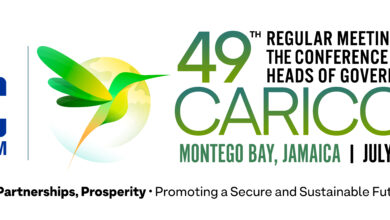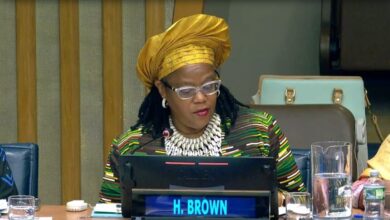Excellencies;
Distinguished Participants and Guests;
Ladies and Gentlemen.
I am pleased to join the Accra Reparations Conference and bring warm and fraternal greetings from the Caribbean Community (CARICOM), through this message. This is an important gathering of policymakers, reparations advocates, experts and civil society activists from Africa, CARICOM and the wider African diaspora to advance the agenda for reparatory justice.
CARICOM Heads of Governments took the historic decision in 2013, to pursue reparations from Europe for the crimes against humanity of native genocide, the trans-Atlantic trade in enslaved Africans and chattel enslavement in the Region. This decision by CARICOM laid the foundation for the rebirth of a global movement for reparatory justice which has been championed by the strong and focused advocacy of the CARICOM Reparations Commission, chaired by Professor Sir Hilary Beckles, respected Caribbean historian and global thought leader on the imperative to pursue reparations.
In CARICOM, our Member State, Haiti, was forced to pay for its freedom twice, first through the successful slave resistance and rebellion which created the first free republic in the western hemisphere in 1804 and the second time through the ignominy of being forced to borrow significant monies from French and American banks to pay reparations to former slaveowners for loss of property – being the very former slaves who had already won their freedom in the Haitian Revolution – and repaying this debt well into the twentieth century.
The crimes committed against humanity are indisputable and the debt has not yet been paid for systemic exploitation, extraction of wealth, pain and suffering, apartheid, Jim Crow and psychological harm, leading to persistent poverty among African-descended people across the globe and the genocide of native peoples which accompanied colonization. To address this cruel history the descendants of the victims are due just restitution, compensation and guarantees of non-repetition.
Reparatory justice for the Caribbean Community is a priority for our Heads of Government, who agree that collaboration with Africa on reparations is critical to moving this agenda further forward. They have expressed their full support for the convening of the Accra Reparations Conference as a strategic and prime opportunity to forge a common, collaborative agenda between the Caribbean and Africa on reparations.
It is in this context that we welcomed the update that the African Union is also seeking to develop a common position on reparations and a roadmap for future collaboration with the African diaspora on reparatory justice. The Accra Reparations Conference is, therefore, timely to facilitate dialogue on the reparations agenda.
Recent meetings of our Heads of Government have tabled important proposals for cooperation with the African Union on reparations. They would welcome collaboration to co-sponsor a resolution on reparations at the United Nations, to signal our joint commitment and our position that reparatory justice ought to receive due consideration by the United Nations.
CARICOM Heads of Government propose to seek an advisory opinion from the International Court of Justice, through the United Nations General Assembly. We invite the African Union to join us in this campaign. We are also working to have reparations included on the agenda of key meetings of intergovernmental bodies. We hope that we can establish appropriate mechanisms to facilitate cooperation on reparations between CARICOM and Africa, including the proposed joint CARICOM-African Union committee of legal experts.
CARICOM welcomes the establishment and excellent advocacy, consultative and research initiatives of the UN Permanent Forum on People of African Descent, and looks forward to deepening collaboration with this body, which includes two distinguished CARICOM representatives.
CARICOM-Africa cooperation has increased in several areas following the First CARICOM-Africa Summit of Heads of Government held in September 2021. AfriCaribbean Trade and Investment Forums have been held in Barbados and Guyana in 2022 and 2023, respectively. The AU-ECOSOCC Study Tour on Reparations was held in Barbados in July 2023. The Caribbean Community has also participated in the Reparations and Racial Healing Summit in August 2022 in Ghana, and welcomes the increased focus on the return of stolen cultural property to both the Caribbean and Africa.
I would like to pay special tribute to our host, the Government of Ghana and especially to President Akufo-Addo for his leadership, powerful advocacy and commitment to the cause of reparatory justice for our respective peoples. Mr President, your public expressions of support, solidarity and vision are highly valued by CARICOM. I am confident that the Accra Reparations Conference will be a success under your leadership.
Excellencies, distinguished participants, we are at an important inflection point in the global movement for reparatory justice, arguably one of the most important human rights movements of our time. There have been important developments, such as the recent apologies from the Government of the Netherlands, the Church of England and prominent families in the United Kingdom, and the establishment of funding mechanisms for repair programmes. We now have legal luminaries, economists and other experts undertaking the important work of costing the damage and further mapping out the compelling case we have for reparatory justice.
It is therefore critical that we seize the moment, and ensure that CARICOM, Africa and others from the diaspora speak with one voice to advance the just and strong call for reparations for the crimes against humanity of native genocide, the trans-Atlantic trade in enslaved Africans and chattel enslavement, all of which were core aspects of European colonization which resulted in deeply embedded and continuing structures of racism and discrimination.
I wish you all a successful conference and look forward to fruitful outcomes of your deliberations.
Thank you, ladies and gentlemen.





